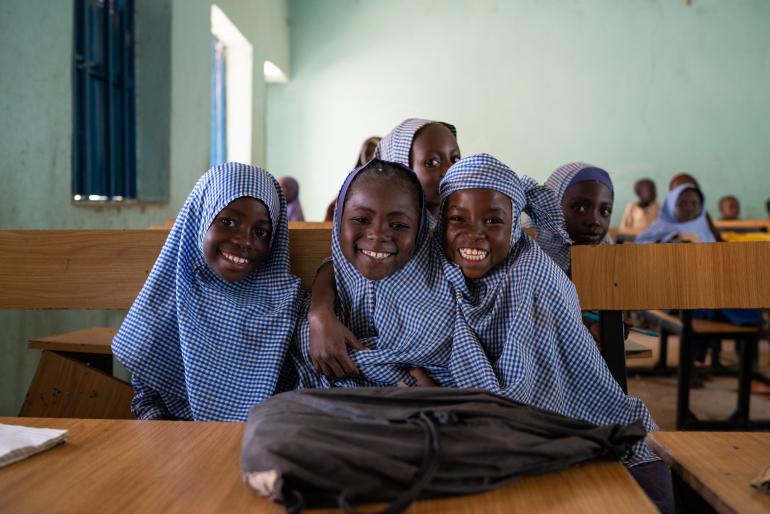By Felix Khanoba
The Girls’ Education Programme Phase 3 (GEP3) has formally come to an end after attracting no fewer than 1.5 million girls to school in its 10 years of existence Nigeria.
The programme, which was initiated in response to low enrolment of girls in school in Northern part of Nigeria, was funded by Foreign, Commonwealth and Development Office (FCDO) of United Kingdom to the tune of $109 million (about N47.5 billion) and implemented by the United Nations Children’s Fund (UNICEF) and the Federal Ministry of Education.
GEP3, which also saw to the training of thousands of teachers and putting in place of enrolment-friendly and economic empowerment schemes, was implemented across six northern Nigerian states of Katsina, Kano, Niger, Sokoto, Zamfara and Bauchi between 2012 and 2022
Speaking at a ceremony to mark the end of GEP3 on Thursday in Abuja , Cristian Munduate, UNICEF Representative in Nigeria, said the programme has not only been successful in getting more girls into formal and non-formal schools, but it has also improved learning outcomes.
“GEP3 has raised the profile of educated girls, created new positive social norms in many communities and enabled a transformational shift in mindsets about the importance of girls’ education. It is critical that we advocate scaling of the approach in all states,” she said.
“I express the deep appreciation of UNICEF to the UK Government for this long-term commitment and funding for girls’ access to primary school in northern Nigeria. Together there remains much work to be done, to ensure that girls transition to, and complete secondary education. This is important not only for the economic prosperity and wellbeing of the girl and her family, but to stem the high population growth expected in Nigeria. We see FCDO and the government of Nigeria as steadfast partners in this complex endeavour,” the visibly elated Munduate added.
Speaking on the education intervention, British High Commissioner to Nigeria, Catriona Laing, expressed delight over the massive education gains recorded in the country as a result of GEP3.
While saying the programme was one of the largest girls education intervention scheme embarked upon by the United Kingdom across the world, the high commissioner called on government at all levels and other stakeholders to build on the GEP3 success stories.
“The GEP 3 has been one of the UK’s largest bilateral Girls’ Education programmes globally. We have seen good progress in improving access for girls and moving towards gender parity but with an increasing population, Nigeria’s out of school children figures remain high, for girls and boys. We now need to ensure that we build on the successful interventions of GEP 3, supporting them to be scaled-up and sustained to ensure they are catalysts for change in the wider sector,” she said.
On her part, Saadhna Panday-Soobrayan, Chief Educationist, UNICEF Nigeria, while presenting a report on results evaluation of GEP 3, noted that over 60,000 teachers were trained on effective implementation of GEP 3, including 8,000 teachers trained on entrepreneurship skills.
She said the conditional cash transfer aspect enabled more girls to stay in school, increased quality of meals served to school children as well as promoted income of households which in turn enabled parents to keep girls in schools.
“In terms of enrolment and retention of girls in schools, GEP 3 proved to be an effective strategy that contributed to reducing out of school children, early marriages and early child bearing among girls under the age of 15,” she stated.
Nigeria’s Minister of State for Education, Goodluck Opiah, who conveyed Federal Government’s appreciation on GEP 3 to the United Kingdom government, UNICEF and other stakeholders, said the programme has made a major difference in the nation’s education sector.
Opiah reiterated President Muhammadu Buhari administration’s commitment to leverage on the GEP3 gains and further explore other opportunities to ensure inclusive and equitable access to quality and functional education especially for girls.
He said records have shown the impressive and outstanding achievements of GEP3 in the implementation of programmes such as: Girls for Girls (G4G); He for She; Youth Advocates, Mentorship; High Level Women Advocates (HilWA); Review of the National Policy on Gender in Nigeria, and in the development of Re-entry Guidelines for Adolescent Girls who dropped out of school prematurely.
“Worthy of commendation also, is the efforts of the GEP3 in building a workable model to get out of school children into school, particularly the girl-child using the cash transfers model; community mobilization; renovation and provision of school infrastructure; improvement of foundational literacy and numeracy through structured pedagogy; and the support for institutionalization of evidence generation for policy planning and implementation,” he said.



